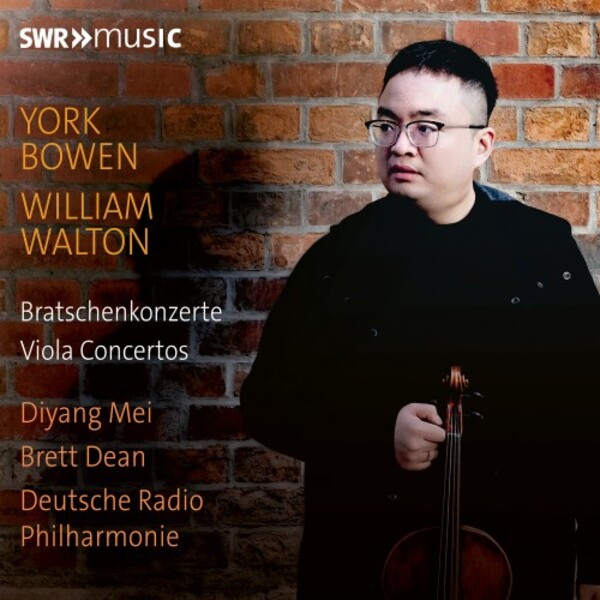BOWEN; WALTON Viola Concertos (Diyang Mei)
View record and artist detailsRecord and Artist Details
Genre:
Orchestral
Label: SWR Music
Magazine Review Date: 12/2024
Media Format: CD or Download
Media Runtime: 64
Mastering:
DDD
Catalogue Number: SWR19158CD

Tracks:
| Composition | Artist Credit |
|---|---|
| Concerto for Viola and Orchestra |
(Edwin) York Bowen, Composer
Brett Dean, Conductor Diyang Mei, Viola German Radio Philharmonic Orchestra |
Author: Geraint Lewis
Viola player Diyang Mei is only 30 years old but already principal viola of the Berlin Philharmonic. His first concerto disc has the benefit of Brett Dean on the podium – a predecessor in the same BPO section, now a celebrated composer internationally and clearly an empathetic spirit as conductor. Together, they explore the viola concertos of York Bowen and William Walton, coupled together for the first time. Walton’s masterpiece needs no introduction: following its 1929 premiere there have been at least 25 recordings. But it was always intended for the legendary Lionel Tertis, who’d given the premiere of York Bowen’s Concerto in 1908. It was Thomas Beecham who suggested the project to Walton and on receipt of the manuscript Tertis turned it down flat – only to repent immediately on hearing his stand-in Paul Hindemith give the first performance. Tertis sadly never recorded either concerto and so this disc, then, is something of a Lionel Tertis tribute.
Both concertos are unashamedly romantic in spirit and both are also perfectly characteristic of the years in which they were written. Bowen’s has an Edwardian opulence and swagger while Walton is already absorbing the rhythmic tang of jazz. But while the Walton is generally regarded as the finest in the repertoire, the Bowen has been largely forgotten, with only a handful of recordings to its name. The comparisons are both fascinating and telling. Bowen does everything he needs to but his material is not memorable and an individual voice eludes him. Walton’s musical personality – initially languid and lingering, later fizzing and irrepressible – is instantly recognisable and has everything under perfect control.
Any newcomer in these works has to contend with Lawrence Power’s sterling versions on differently coupled Hyperion discs. His recording of the Walton (7/07) is essential, partly because it’s the only one since 1961 to use the original scoring. Having reduced the woodwind and brass and eliminating the tuba, Walton tellingly added a harp. This makes a genuine difference to the sound world and in this revised version I recommend James Ehnes’s bracing account with Edward Gardner (Chandos, 6/18). This conforms to the two earliest composer-conducted recordings and comes in at well under 24 minutes, whereas Mei follows later habits and is generally slower at closer to 28'. This is still very enjoyable playing but it allows the music to sag dangerously in places. The Deutsche Radio Philharmonie are vividly recorded in SWR’s Kaiserslautern studio and provide committed support throughout to this impressive concerto debut from a rising star performer.
Discover the world's largest classical music catalogue with Presto Music.

Gramophone Digital Club
- Digital Edition
- Digital Archive
- Reviews Database
- Full website access
From £8.75 / month
Subscribe
Gramophone Full Club
- Print Edition
- Digital Edition
- Digital Archive
- Reviews Database
- Full website access
From £11.00 / month
Subscribe
If you are a library, university or other organisation that would be interested in an institutional subscription to Gramophone please click here for further information.





